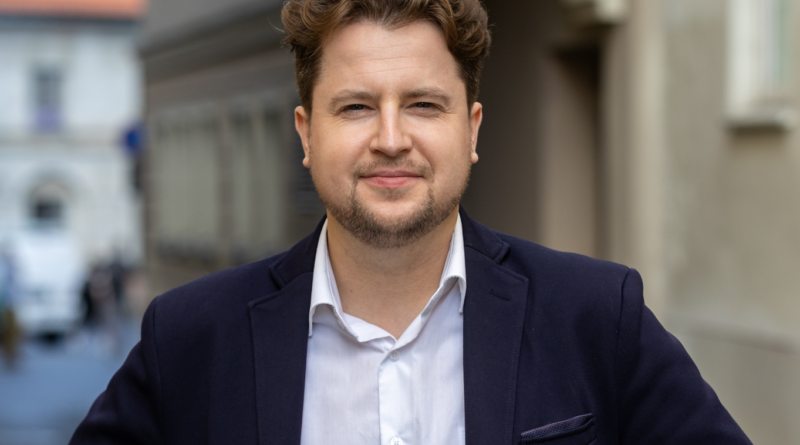Dr. Laurynas Peluritis on Cultural Synthesis and Tolerance (March 20, 2025)
The European Centre for Philosophy of Culture (Faculty of Philosophy, UW) invites for the lectures by Dr. Laurynas Peluritis (Vilnius University). Our guest will deliver two lectures: “Why Should We Talk About Cultural Synthesis?” and “Is Tolerance a Virtue?” on March 20, 2025 at our faculty (Krakowskie Przedmiescie 3).
- Why Should We Talk About Cultural Synthesis?
Is cultural synthesis a necessary condition for the survival and flourishing of national identities, or is it merely a theoretical construct that struggles to find relevance in today’s fragmented world? In an era of geopolitical instability, resurgent nationalism, and the erosion of common cultural narratives, the idea of synthesis remains contested. Does it offer a way forward for societies seeking to balance tradition and modernity, national distinctiveness and cosmopolitan openness?
In this lecture, Dr Laurynas Peluritis will explore the philosophical and historical foundations of cultural synthesis, focusing on Stasys Šalkauskis (1886–1941), one of Lithuania’s most influential modern thinkers. Positioning Lithuania at the crossroads of East and West, Šalkauskis argued that national cultures should neither isolate themselves nor passively assimilate into dominant civilisational forces. Rather, he proposed a dynamic synthesis of universal and particular elements, in which national identity remains distinct yet enriched through engagement with broader intellectual currents.
Through a discussion of Šalkauskis’s ideas, this lecture will explore their implications for contemporary Central and Eastern Europe, a region historically shaped by cultural clashes, imperial legacies, and shifting political boundaries. How can we rethink cultural synthesis today, particularly in relation to nationalism, globalization, and European integration? Is synthesis a sustainable model for cultural and political development, or does it risk diluting national identity in pursuit of unattainable harmony? This lecture will engage with these questions through the lenses of political philosophy, intellectual history, and contemporary geopolitical challenges.
Time: 20.03, 1:15-2:45pm
Place: Faculty of Philosophy, Krakowskie Przedmieście 3, room 209
- Is Tolerance a Virtue?
What is tolerance in political and social life? Is it a fundamental virtue necessary for sustaining pluralistic societies or merely a pragmatic concession to preserve stability? Drawing on classical philosophy, modern political thought, and contemporary debates, Dr. Laurynas Peluritis will examine the origins of tolerance, its role in liberal democracies, and the challenges it faces today.
The lecture will explore whether tolerance is inherently a moral good or whether it must be evaluated in relation to external principles such as justice, power, and social cohesion. Is tolerance always a force for good, or can it serve as an instrument of oppression? Thinkers like Herbert Marcuse, in his critique of “repressive tolerance,” have argued that it can sometimes reinforce existing power structures rather than challenge them. How should societies navigate the tension between allowing diverse perspectives and preventing harm? Where, if anywhere, can we draw the limits of tolerance?
By engaging with historical and philosophical perspectives—from classical virtue ethics to contemporary liberal theory—this lecture will critically assess whether tolerance should be considered a fundamental virtue or a contingent, context-dependent principle shaped by external political and social imperatives.
Time: 20.03, 3-4:30pm
Place: Faculty of Philosophy, Krakowskie Przedmieście 3, room 209
Contact: dr Przemysław Bursztyka (pbursztyka@uw.edu.pl)
Dr. Laurynas Peluritis is an Assistant Professor at the Institute of Philosophy at Vilnius University and a lecturer in the Faculties of Philosophy and History. He is also the Head of Research and Analytics at the Institute of European Right, a political think tank in Vilnius. In 2022, he defended his interdisciplinary dissertation, “The Cave and Two Suns. Philosophy in Soviet Lithuania (1944–1986). Institutions, Personalities, Ideas”, at the Faculty of History at Vilnius University. His research focuses on political philosophy, the history of ideas and concepts, and Lithuanian philosophy. In 2024, he was awarded the State Independence Scholarship by the Seimas (Parliament) of the Republic of Lithuania for his research project “State-Building as a Cultural Task in a World of Fragile Relationships: The Reactualisation of the Cultural Philosophy of Stasys Šalkauskis.”

